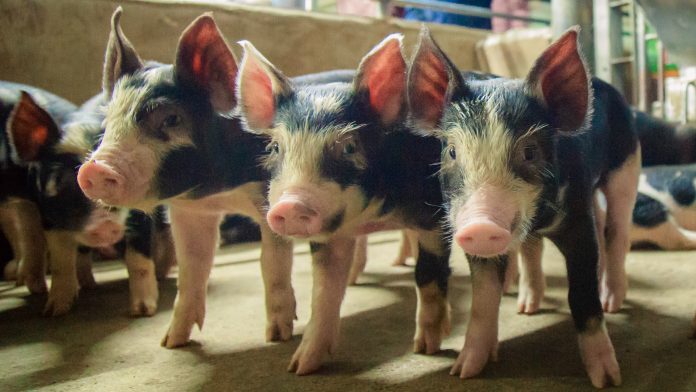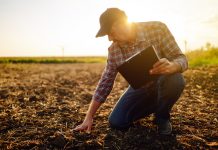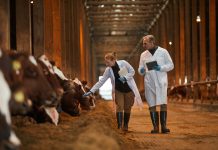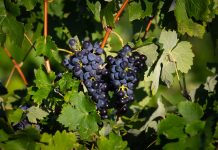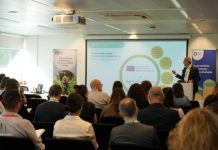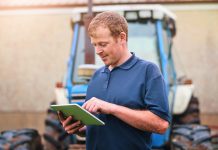Peter Stevenson OBE, Chief Policy Advisor from Compassion in World Farming, provides a perspective on industrial livestock production
We have created a food system that, rather than nourishing us, makes us ill. Globally poor diet is one of the main causes of disease and mortality. And industrial agriculture is undermining the core elements – soils, water and biodiversity – on which the future health of farming depends.
Industrial livestock production is a key driver of many of these harms. Indeed, it will place many of the UN 2030 Sustainable Development Goals (SDGs) out of reach. Industrial livestock production is dependent on feeding soy and human-edible cereals (such as wheat, barley and maize) to animals who convert them very inefficiently into meat and milk. This undermines SDG 2 which aims to achieve food security. If the cereals used as animal feed were instead used for direct human consumption an extra 3.5 billion people could be fed each year.
In the EU and U.S. around two-thirds of cereals are used as animal feed. Globally the figure is 40%. Industrial livestock’s huge demand for grain has fuelled the intensification of crop production. This, with its monocultures and agro-chemicals, has led to soil degradation, pollution and overuse of water and biodiversity loss. This works against SDGs 2, 14 and 15 which focus on the environment.
77% of global soy is used as feed, mainly in the industrial pig and poultry sectors. This is a key driver of deforestation, which releases huge amounts of stored carbon into the atmosphere.
The high levels of consumption of red and processed meat made possible by industrial livestock production contribute to heart disease, obesity, diabetes and certain cancers. Industrial production routinely uses antibiotics to prevent the diseases that are inevitable when animals are kept in poor conditions. This leads
to antibiotic resistance which can be transferred to people, so diminishing the efficacy of some crucial antibiotics needed to treat human disease.
The last pandemic before COVID emerged from farm animals. This was the 2009 swine flu pandemic that started in Mexico, close to a major concentration of industrial pig farms. A recent study concludes that European pig farms – most of which are industrial – host building blocks for pre-pandemic influenza viruses.
Industrial animal agriculture is inhumane, treating animals not as sentient beings, but as objects placed in this world for our convenience. Worldwide, millions are confined in cages or crates so narrow that they cannot even turn round, while others are packed into barren, overcrowded sheds. Selective breeding for fast growth, high yields and large litters have led to millions suffering from painful health problems.
Far-reaching reforms of our food systems are vital
We need to move to regenerative agriculture. This aims to minimise the use of artificial fertilisers and chemical pesticides by supporting — and harnessing — natural processes. Soil quality is enhanced by the use of composts, legumes that can ‘fix’ atmospheric nitrogen
into the soil, rotations, and manure from animals raised on the farm. Pesticide use is minimised by integrated pest management, which uses natural processes to tackle pests and plant diseases. Biodiversity is restored enabling farmland birds and pollinators to thrive once again.
The link between animals and the land should be re-established with animals being farmed on well- managed grassland or in integrated crop-livestock systems where their manure, rather than being a pollutant, fertilises the soil.
“77% of global soy is used as feed, mainly in the industrial pig and poultry sectors. This is a key driver of deforestation, which releases huge amounts of stored carbon into the atmosphere.”
The role of livestock should be redefined; animals only make a positive contribution to food production when they convert materials we cannot consume – grass, by- products, unavoidable food waste – into the food we can eat. Feeding animals in this way would lead to a halving of global meat consumption with major health benefits in overconsuming countries and substantial environmental gains. Livestock produce 14.5% of global greenhouse gas emissions; without a marked reduction in meat consumption, it will be very difficult to meet the Paris climate targets. However, people in the poorest countries should not be expected to reduce their meat consumption.
Range of measures needed to reconfigure our food systems
The detrimental impacts of industrial agriculture on our health and the environment involve massive costs, but these are ignored in the retail price of food making unhealthy, unsustainable food appear to be cheap. We need to mend our price system so that it reflects true costs. Taxes should be placed on unhealthy, environmentally damaging food, including industrially produced meat. Crucially, all revenue raised from these taxes must be used to lower the price of healthy food produced to high environmental and animal welfare standards. There must be no overall increase in the price of food, simply a rebalancing of the relative costs of sustainable and unsustainable food.
Farm subsidies should be repurposed to support regenerative agriculture. Taxes should be placed on the damaging inputs of industrial agriculture, such as agrochemicals and feed containing soy and human- edible cereals. The funds raised by such taxes and repurposed subsidies should be used to support farmers who produce high-quality food.
In many governments, and internationally, food policy is formulated in silos. Instead, cohesive food and farming policies must be developed that seek to fulfil a range of objectives, including the production of nutritious, environmentally sustainable food produced to high animal welfare standards and the delivery of decent farmer livelihoods.
Governments must challenge the vested interests that promote industrial agriculture because their business model depends on it. These include the manufacturers of agro-chemicals, animal pharmaceuticals, and the cages and equipment used in industrial livestock production, as well as the international grain traders who provide feed for industrially farmed animals. Moreover, governments must curb the banks that finance industrial livestock production across the globe.
Only a holistic approach, which protects the health and well-being of animals, people and the planet, will ensure that we create a sustainable global food system truly fit for the future.

